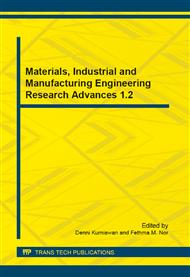[1]
Li, S. et al., (2005). Development and validation of a measurement instrument for studying SCM practices,. Journal of Operations Management, Vol. 23(6): 618-641.
Google Scholar
[2]
Wang, F-K., and Du, T. (2007). Applying capability index to the supply network analysis,. Total Quality Management & Business Excellence, Vol. 18(4), 425-434.
DOI: 10.1080/14783360701231807
Google Scholar
[3]
Lambert, D.M., Cooper, M.C. &Pagh, J.D. (1998). Supply Chain Management Implementation Issues and Research Opportunities. The International Journal of Logistics Management, 11, (1), 1-17.
DOI: 10.1108/09574099810805807
Google Scholar
[4]
Gharakhani, D. et al., (2012). Impact of supply chain management practices on innovation and organizational performance in Iranian companies, African Journal of Business Management Vol. 6(19), 5939-5949.
DOI: 10.5897/ajbm11.1136
Google Scholar
[5]
Halley, A. and Beaulieu, M. (2010), 'A multidimensional analysis of supply chain integration in Canadian manufacturing', Canadian Journal of Administrative Sciences, Vol. 27 No. 3, 174-87.
DOI: 10.1002/cjas.144
Google Scholar
[6]
Holt, D. and Ghobadian, A. (2009), An empirical study of green supply chain management practices amongst UK manufacturers, Journal of Manufacturing Technology Management, Vol. 20 No. 7, 933-56.
DOI: 10.1108/17410380910984212
Google Scholar
[7]
Bhutta, M.K.S., Rana, A.I. and Asad, U. (2007), SCM practices and the health of the SMEs in Pakistan, SCM: An International Journal, Vol. 12 No. 6, 412-22.
DOI: 10.1108/13598540710826344
Google Scholar
[8]
Chow, W.S., Madu, C.N., Kuei, C., Lu, M.H., Lin, C. and Tseng, H. (2008). 'Supply chain management in the US and Taiwan: an empirical study', Omega, Vol. 36, 565-79.
DOI: 10.1016/j.omega.2006.01.001
Google Scholar
[9]
Koh, S.S. et al., (2007). The impact of SCM practices on performance of SMEs, Industrial Management & Data Systems, Vol. 107. No. 1, 103-24.
Google Scholar
[10]
Ou, C. S., et al., (2010). A structural model of supply chain management on firm performance. International Journal of Operations &Production Management, 30, 526-545.
DOI: 10.1108/01443571011039614
Google Scholar
[11]
Williams, S. J. (2006). Managing and developing suppliers: Can SCM be adopted by SMEs? International Journal of Production Research, 44(18/19), 3831-3846.
DOI: 10.1080/00207540600849133
Google Scholar
[12]
Kim, D., Cavusgil, S.T. and Calantone, R.J. (2006), Information system innovations and supply chain management: channel relationships and firm performance, Journal of the Academy of Marketing Science, Vol. 34 No. 1, 40-54.
DOI: 10.1177/0092070305281619
Google Scholar
[13]
Vaart, T. V. D. and Donk, D. P. V., (2008). Opportunities and realities of supply chain integration: the case of food manufacturers, British Food Journal, Vol. 110, 218 – 235.
DOI: 10.1108/00070700810849925
Google Scholar
[14]
Power, D. J., Sohal, A, and Rahman, S. U. (2001). Critical success factors in agile supply chain management: an empirical study. International Journal of Physical Distribution and Logistics Management; 31(4): 247–65.
DOI: 10.1108/09600030110394923
Google Scholar
[15]
Moberg, C. R. et al., (2002). Identifying Antecedents of Information Exchange within Supply Chains, Int. Journal of Physical Distribution and Logistics, 32(9), 755-770.
DOI: 10.1108/09600030210452431
Google Scholar
[16]
Perry, M., and Sohal, A. S. (2000). Quick Response Practices and Technologies in Developing Supply Chains a Case Study, International Journal of Physical Distribution and Logistics, 30(7/8), 627-639.
DOI: 10.1108/09600030010346369
Google Scholar
[17]
Petrovic-Lazarevic, S. et al., (2007). Supply Chain Improvement Initiatives in the Australian Textiles, Clothing, Footwear and Leather Industry: A Field Study, International Journal of Logistics Systems and Management, 3(1), 1-19.
DOI: 10.1504/ijlsm.2007.012068
Google Scholar
[18]
Chang, S.C., Lin, R.J., Chen, J.H. and Huang, L.H. (2005), Manufacturing flexibility and manufacturing proactiveness: empirical evidence from the motherboard industry, Industrial Management & Data Systems, Vol. 105 No. 8, pp.1115-32.
DOI: 10.1108/02635570510624482
Google Scholar
[19]
Wu, F., Yeniyurt, S., Kim, D. and Cavusgil, S.T. (2006), The impact of information technology on supply chain capabilities and firm performance: a resource-based view, Industrial Marketing Management, Vol. 35, pp.493-504.
DOI: 10.1016/j.indmarman.2005.05.003
Google Scholar
[20]
Lyons, A., Coleman, J., Kehoe, D. and Coronado, A. (2004), Performance observation and analysis of an information re-engineered supply chain: a case study of an automotive firm, Industrial Management & Data Systems, Vol. 104 No. 8, pp.658-66.
DOI: 10.1108/02635570410561645
Google Scholar
[21]
Zakuan, N.M., Yusof, S.M. and Laosirihongthong, T. (2008).
Google Scholar


